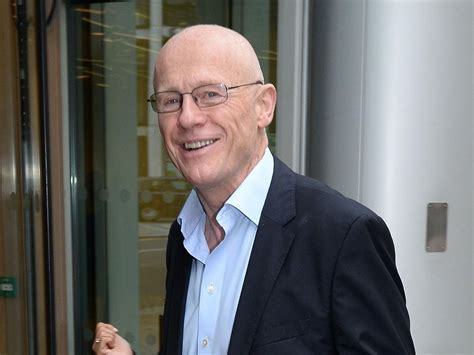A Quote by Joel Osteen
Buying a share of a good business is better than buying a share of a bad business. One way to do this is to purchase a business that can invest its own money at high rates of return rather than purchasing a business that can only invest at lower ones. In other words, businesses that earn a high return on capital are better than businesses that earn a low return on capital.
Related Quotes
Over the long term, it's hard for a stock to earn a much better return that the business which underlies it earns. If the business earns six percent on capital over forty years and you hold it for that forty years, you're not going to make much different than a six percent return - even if you originally buy it at a huge discount. Conversely, if a business earns eighteen percent on capital over twenty or thirty years, even if you pay an expensive looking price, you'll end up with one hell of a result.
As I have mentioned before, we cannot make the same sort of money out of permanent ownership of controlled businesses that can be made from buying and reselling such businesses, or from skilled investment in marketable securities. Nevertheless, they offer a pleasant long term form of activity (when conducted in conjunction with high grade, able people) at satisfactory rates of return.
Contrary to the rhetoric emanating from the American left, the 'rich' are currently paying a lot more than 'their fair share.' It is only a handful of mega-rich, those whose entire incomes are derived from dividends and capital gains, rather than salaries or business profits, who have the ability to pay lower tax rates than some members of the middle class. The left knows this but continues to build their 'freeloading millionaire' straw man because it makes good politics.
The history of taxation shows that taxes which are inherently excessive are not paid. The high rates inevitably put pressure upon the taxpayer to withdraw his capital from productive business and invest it in tax-exempt securities or to find other lawful methods of avoiding the realization of taxable income. The result is that the sources of taxation are drying up; wealth is failing to carry its share of the tax burden; and capital is being diverted into channels which yield neither revenue to the Government nor profit to the people.
Obviously, consideration of costs is key, including opportunity costs. Of course capital isn't free. It's easy to figure out your cost of borrowing, but theorists went bonkers on the cost of equity capital. They say that if you're generating a 100% return on capital, then you shouldn't invest in something that generates an 80% return on capital. It's crazy.
If you talk to anyone involved in business - forget banks and big business - talk to small businesses - do it yourself, don't ask me - they'll tell you it's crippling. Small-business formation is the lowest it has ever been in a recovery, and it's really for two reasons. One is regulations and the second is access to capital for people starting new businesses.
While business advertises, charity is taught to beg. While business motivates with a dollar, charity is told to motivate with guilt. While business takes chances, charity is expected to be cautious. We measure the success of businesses over the long term, but we want our gratification in charity immediately. We are taught that a return on investment should be offered for making consumer goods, but not for making a better world.




































